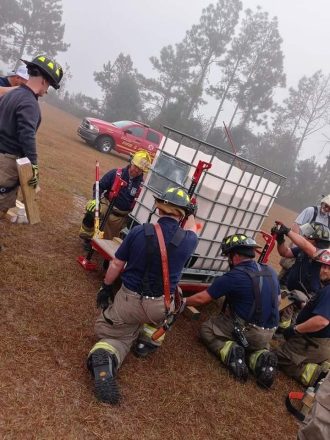DCFR takes part in Ag Extrication course
Published 10:37 am Wednesday, December 8, 2021

- Regional firefighters and engineers took part in an ag extrication class over the weekend, learning how to help in the event someone is stuck under a machine.
|
Getting your Trinity Audio player ready...
|
Over the weekend, 32 individuals from Decatur County Fire and Rescue, along with other regional fire departments partook in a farm extrication class, designed to teach engineers how to respond in time sensitive situations involving farm equipment.
Known as Farm Medic, the class is sponsored by GEMSA (Georgia EMS Association) and funded by the Georgia Trauma Commission. The Commission’s goal is to showcase real life scenarios.
DCFR Engineer Tyler Dalton said this particular class showed them how to respond to an individual pinned underneath a tractor and how to respond when someone becomes entangled in a PTO shaft.
New to the class was a scenario teaching how to rescue an individual trapped in a grain bin.
“It teaches how to use the common equipment we carry every day to respond to something like that,” Dalton explained.
Dalton said it’s not often they have to use the skills taught in the class, as they usually respond to only one ag extrication call a year, but it is still important to have the knowledge.
“It’s one of those specialty skills that is something we don’t use every day, but we push to have it at least every two years, so we can get a refresher,” Dalton said. “The biggest thing the class teaches us is resources, like mechanics, who can come out to the field if we don’t have the right equipment.”
Dalton said that regionally Grady County, Thomas County, Seminole County, Mitchell County, Upson County and the City of Cairo participate in the class.
However, Dalton acknowledges that without the help of Bridges Equipment the class would not have been possible.
As part of the class, engineers have to look at different types of equipment such as, hay balers, mowers, peanut pickers, tractors and more.
“We had to find a facility that would allow us to come see the equipment and touch the equipment,” Assistant Chief Jamie Earp said. “Bridges Equipment is one of the people each year who allows us to come there and actually lets us host the class there. They were phenomenal and we couldn’t do it without them.”
Dalton concluded by reiterating his thanks to community partners like Bridges Equipment and his thanks to GEMSA for bringing the class to Southwest Georgia, which is such a large agricultural region.
“Although it’s something we touch rarely, it’s important that when it does happen we know what we are doing and that we can save those limbs,” Dalton finished.





